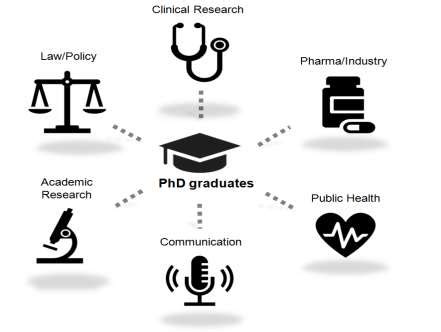Embarking on a PhD in Biology opens doors to an array of fulfilling career paths. This article illuminates the diverse opportunities available, empowering you to navigate your professional journey with confidence.

Academic Research
PhD graduates excel in academic research, driving scientific discoveries and pushing the boundaries of knowledge. They are employed as professors or research scientists at universities, research institutions, and pharmaceutical companies.
According to data from the National Science Foundation (NSF), the median annual salary for biologists and life scientists is approximately $96,500. Research scientists, particularly those with industry experience, can earn substantially higher salaries.
Government and Policy
Biology PhD holders contribute expertise to government agencies and policy-making bodies. They advise on environmental protection, public health, and biotechnology regulations. The US Bureau of Labor Statistics estimates that environmental scientists and specialists earn a median annual salary of $76,530.
Industry and Biotechnology
The biotechnology industry offers lucrative opportunities for PhD graduates. They can work in product development, quality control, or management at pharmaceutical companies, medical device manufacturers, and agricultural biotechnology firms. The Pharmaceutical Research and Manufacturers of America (PhRMA) reports that the average annual salary for scientists in the pharmaceutical industry is $127,000.
Education and Outreach
Biology PhD holders play a vital role in science education and public outreach. They work as science educators, curriculum developers, or science communicators at museums, schools, and non-profit organizations. According to the National Science Teachers Association, the average annual salary for high school biology teachers with a PhD is $67,300.
Science Communication
The demand for clear and engaging science communication is growing. PhD graduates can leverage their scientific knowledge and communication skills to become science writers, journalists, or public relations specialists. The American Society of Business Publication Editors (ASBPE) reports that the average annual salary for science writers is $60,000.
Industry Consulting
With their deep scientific understanding and analytical abilities, PhD graduates are well-suited for consulting roles in the pharmaceutical, biotech, and medical device industries. They provide expert advice on clinical trial design, data analysis, and regulatory compliance.
Entrepreneurship and Business
Some PhD graduates venture into entrepreneurship and business, using their scientific knowledge and research skills to launch their own companies or commercialize new technologies. According to the National Bureau of Economic Research, about 10% of PhD graduates start their own businesses within five years of graduation.
Pain Points and Motivations
Navigating the job market with a PhD in Biology can present challenges. Competition for tenure-track faculty positions can be intense, and salaries in certain sectors may not be as high as in others. However, a PhD in Biology offers a strong foundation for a meaningful and rewarding career.
Motivations for pursuing a PhD in Biology include:
- Passion for scientific discovery and research
- Desire to contribute to advancements in science
- Aspirations for a leadership role in academia or industry
- Commitment to science education and outreach
Common Mistakes to Avoid
To maximize your career options, avoid these common mistakes:
- Failing to network and attend industry events
- Not developing strong communication and presentation skills
- Narrowing your focus too early without exploring other career paths
- Neglecting professional development and continuing education
Why a PhD in Biology Matters
A PhD in Biology provides:
- Advanced scientific knowledge and analytical abilities
- Critical thinking and problem-solving skills
- Strong communication and presentation capabilities
- Membership in a global network of STEM professionals
Benefits of a PhD in Biology
The benefits of a PhD in Biology include:
- Diverse career opportunities in research, industry, government, and education
- Higher earning potential compared to those with only a bachelor’s or master’s degree
- Eligibility for prestigious research grants and fellowships
- Opportunities to shape the future of science and technology
Table 1: Career Options for PhD Graduates in Biology
| Career Path | Median Annual Salary |
|---|---|
| Professor | $101,980 |
| Research Scientist | $96,500 |
| Environmental Scientist | $76,530 |
| Science Educator | $67,300 |
| Science Writer | $60,000 |
Table 2: Motivations for Pursuing a PhD in Biology
| Motivation | Reason |
|---|---|
| Passion for scientific discovery | Driven by an intense desire to uncover new knowledge |
| Contribution to science | Aspiration to make significant contributions to the advancement of scientific understanding |
| Leadership role | Ambition to lead research teams or scientific organizations |
| Science education | Desire to inspire future generations of scientists and foster scientific literacy |
Table 3: Common Mistakes to Avoid for PhD Graduates in Biology
| Mistake | Impact |
|---|---|
| Failure to network | Limits career opportunities and professional growth |
| Weak communication skills | Impedes effective presentation of research and hampers collaboration |
| Lack of exploration | Narrowing options prematurely without considering all career paths available |
| Neglect of professional development | Inhibits career advancement and perpetuates knowledge gaps |
Table 4: Benefits of a PhD in Biology
| Benefit | Impact |
|---|---|
| Diverse career opportunities | Opens doors to a wide range of professions in academia, industry, and government |
| Higher earning potential | Significant salary premium compared to those with lower educational attainment |
| Research grant eligibility | Access to funding to pursue innovative research projects |
| Shaping the future | Influence on scientific discoveries and technological advancements that impact society |
